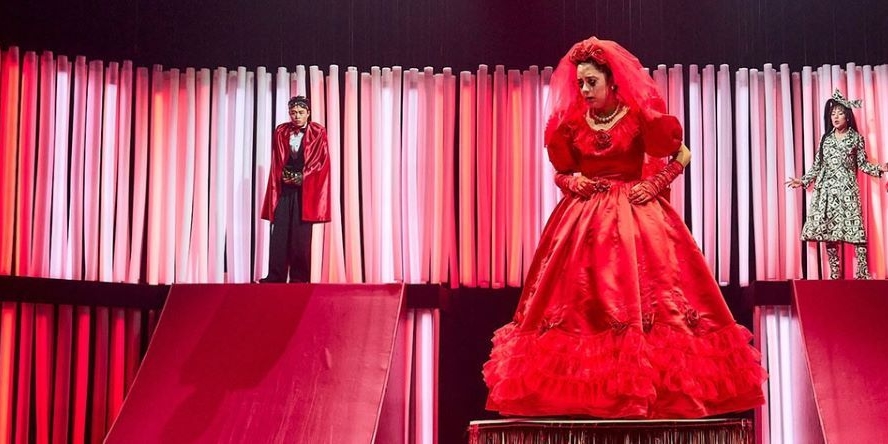This is the 80th anniversary year of a play that has become accepted as one of Brecht’s most durable, where the balance between off-kilter dark humour and didacticism is kept in place, and the mordant critique of capitalism and its excesses is moored to some memorable characters and thought-provoking dilemmas. It comes to us here in a zany and confronting production by Anthony Lau with a translation by Nina Segal that seeks to update the play to include a good number of contemporary issues unknown in Brecht’s time. Pacy, quirky and inventive throughout, and very much aimed at engaging a younger audience attuned to game shows and reality TV humiliations, this version is never less than engaging but patchy in its success, with the second half very much more cohesive and successful than the first.
The premise of the play is that three gods have come to earth to identify and reward one truly good person and thereby avert an apocalypse. They have trouble finding anyone in this poverty-stricken city in Szechwan, but eventually settle on She Te, a sex worker, who at least offers them some accommodation for the night. They give her $1000 to allow her to set up in business, but this turns out to be a very mixed blessing as all her neighbours converge on her to seek to take advantage of her good fortune. Their rapaciousness and her naivety and generosity of spirit ensures that she loses the money quickly and even incurs debt. So instead, in the second half, she reinvents herself as her cousin Shui Ta. She protects herself through this male persona by using newly gendered guile and ruthlessness to make a fortune through strong-arming the locals into working in a cigarette factory. The gods are forced to confront the fact that in a conventional society goodness will always be outwitted and commodified – either society has to change or success will go uniformly to wily, unscrupulous, male figures such as Shui Ta. The audience are invited to intervene to bring this about.
The set design is very striking – two ramps either side of the stage, all of which is covered with a garish red lineoleum, and a curtained surround of white plastic tubes, which later morph into cigarettes. Plenty of scope here for dramatic entrances and exits. A large number of outlandish props move on and off and the action is interspersed with a series of karaoke-style song and dance routines that very crudely underline the message of each scene. It is a large cast with plenty of doubling of roles involving swift costume changes. The townsfolk are more cartoonish, more bundles of emblematic (and often unpleasant) characteristics than fully developed characters. The first half feels overlong and at times tedious as the litany of wrongs against Shen Te accumulates; whereas the action achieves more focus and direction in the second half around the decisive and divisive figure of her rogue cousin.
There are plenty of technical challenges for the actors, which they mostly meet with panache, though it all does seem relentless once the initial argument is put across. Ami Tredrea has a lot to do in the lead role, switching from female to male guise with clownish bravura. Around her Leo Wan stands out as the plaintive and hapless water-carrier, Wang. Aidan Cheng is an effectively heartless love interest, and sings quite beautifully. Melody Brown plays a rapacious landlady with suitable swagger, and Louise Mai Newberry is the most agressively greedy and shameless of the various neighbours. Callum Coates offers gentler tones in a variety of roles and provides an effective impersonation of Brecht himself in the closing moments. John Chew makes a convincingly kinky supermarket boss. The three gods deliver a welcome contrast to all this hyperactivity with a wry and caustic commentary on the hectic proceedings.
This is a slick and accomplished production that is perhaps in the end just a bit too clever for its own good. While the farcical knock-about Brecht of ‘The Threepenny Opera’ should always be on view here, there are also serious themes that need more time to register than happens here amid all the slapstick hurly-burly and colourful incident.

